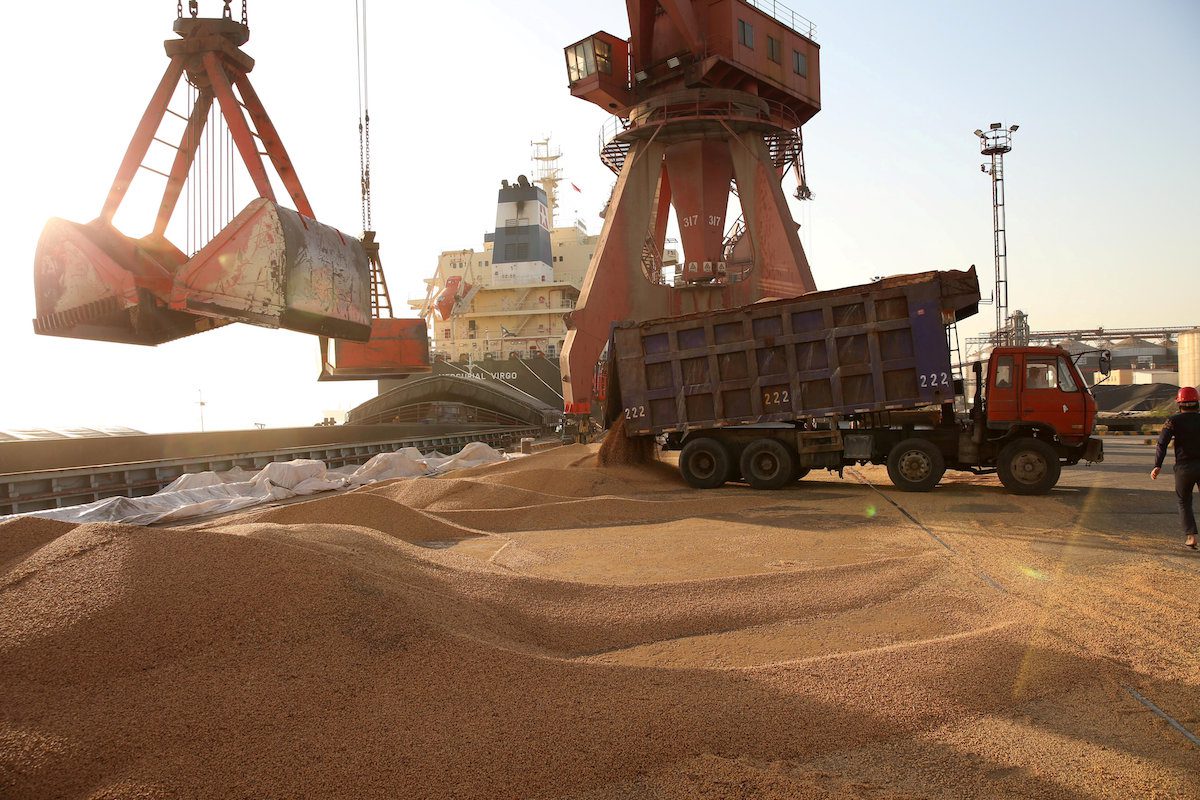FILE PHOTO – Workers transport imported soybeans at a port in Nantong, Jiangsu province, China April 9, 2018. REUTERS/Stringer/File Photo
 By Julie Ingwersen and Humeyra Pamuk CHICAGO/WASHINGTON Dec 13 (Reuters) – U.S. government officials on Thursday hailed China’s first meager purchase of U.S. soybeans since its trade war with the United States began in July and said they hoped for, but could not guarantee, more to come.
By Julie Ingwersen and Humeyra Pamuk CHICAGO/WASHINGTON Dec 13 (Reuters) – U.S. government officials on Thursday hailed China’s first meager purchase of U.S. soybeans since its trade war with the United States began in July and said they hoped for, but could not guarantee, more to come.
The U.S. Department of Agriculture (USDA) announced private sales of 1.13 million tonnes of U.S. soybeans to China, a figure that farmers and grain traders said was not large enough on its own to lift slumping prices or absorb a huge surplus that has accumulated across the farm belt.
The sale was first reported by Reuters on Wednesday, a day after U.S. President Donald Trump told Reuters in an exclusive interview that China was buying a “tremendous amount” of U.S. soybeans.
“Having a million, million-and-a-half tonnes is great, it’s wonderful, it’s a great step,” USDA Deputy Secretary Steve Censky said at an Iowa Soybean Association annual meeting on Thursday. “But there needs to be a lot more as well, especially if you consider it in a normal, typical year, we’ll be selling 30 to 35 million metric tonnes to China.”
“We think it is a good start, it is promising,” Secretary of Agriculture Sonny Perdue told reporters in Washington. “We are certainly hopeful and expecting that it’ll come through,” he said, in reference to further sales.
Asked if there had been any talks with China for further purchases, Perdue said: “No. Not that we’ve had, but as you know, the U.S. Trade Representative is in charge of that.”
Soybean prices fell on Thursday as grain traders eyed a massive U.S. soybean surplus in storage, and what is expected to be a record-large harvest from the world’s biggest soybean exporter, Brazil, just weeks away.
The U.S. soybean sales to China came after Trump and China’s President Xi Jinping agreed to a 90-day detente in their tit-for-tat tariff war to negotiate a trade deal after meeting at the Group of 20 summit in Buenos Aires.
The purchases, which traders said were made by state-owned companies in China, were viewed as the most concrete evidence yet that Beijing is making good on pledges the U.S. government said Xi made when the two leaders met on Dec. 1.
While it was the ninth largest single-day U.S. soybean sale on record, it amounted to just 3.5 percent of China’s U.S. soy purchases last year and 2 percent of U.S. shipments to all foreign buyers.
“If further activity and amounts aren’t confirmed, the trade could soon be ready to settle in for a long, cold, fundamentally bearish winter,” said Matt Zeller, market intelligence analyst with INTL FCStone.
With exports to China drying up, U.S. soybean prices have traded around their lowest levels in a decade in recent months. The actively traded Chicago Board of Trade March soybean contract fell more than 1 percent on Thursday to the lowest in a week, in the steepest drop in 2-1/2 weeks.
TRADE AID DELAYED
The White House this week delayed additional payments from a promised $12 billion aid package for farmers stung by the trade war because it expected Beijing to resume buying U.S. soybeans.
“We’ve been arm wrestling with our folks from the OMB,” Censky said, in reference to the White House Office of Management and Budget, which must sign off on the payouts.
Perdue said he would be meeting with the White House on the issue on Friday and expected that the second tranche would eventually be paid.
“OMB … is always looking to hold onto money. I think this is a commitment the president had made. … We hope to have it resolved very soon,” he said.
He said he believed that trade issues remained damaging enough to U.S. agricultural export markets to warrant the second tranche of payments, despite the buying from China.
The 25 percent tariff Beijing imposed on U.S. soy shipments in July in retaliation for American duties on Chinese goods remains in place.
China last year bought about 60 percent of U.S. soybean exports in deals valued at more than $12 billion. The purchases confirmed on Thursday were less than $500 million.
U.S. exports to China dropped to 8.2 million tonnes in the first 10 months of the year, with the vast majority of that shipped before the tariffs took effect in July.
(Reporting by Karl Plume and Julie Ingwersen in Chicago and Humeyra Pamuk in Washington; editing by Caroline Stauffer, Jonathan Oatis and Richard Chang)
(c) Copyright Thomson Reuters 2018.

 Join The Club
Join The Club











